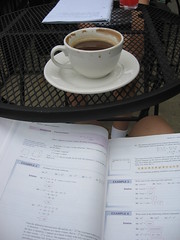The things I think about when I hear about people who are living in the currently-being-bombed areas of Lebanon and Israel are things like: Are schools still open? Are people going to work? Is public transportation still running? Do you still get mail (like bills)? Are you in trouble if you choose to stay home from work or school? Are the hospitals okay (fully staffed, with enough supplies, etc.)? Do ethnic/religious/economic tensions within smaller communities become inflamed? Does people's economic standing take a big hit during times like these? How long can a "conflict" last before it starts causing lasting damage to the people and the government, as well as the larger society?
When infrastructure is destroyed, I wonder how people get food and water and electricity. Remember how everything just fell apart for the poor (or really, most of the non-rich) in New Orleans and the rest of the Hurricane-ravaged coastal areas of the South after Katrina?
With all of the prescience we had via meterlogical science and emergency management (I'm not talking about bush run FEMA, obviously, but other knowledgable em. management people), there was a terrible nescience. Although even a "third world"ish nation like Cuba has tons of experience with hazardous weather (and from what I read, a good system for preventing casualties), we didn't (or the gubmint didn't) take any cues from them. Because we are naturally supieror, they are commies, etc. ARGH.
Anyhow.
Lots to think about. Reminds me of Octavia Butler's Parable of the Sower (although the follow up, Parable of the Talents, was my favourite of the two).
Subscribe to:
Post Comments (Atom)



No comments:
Post a Comment